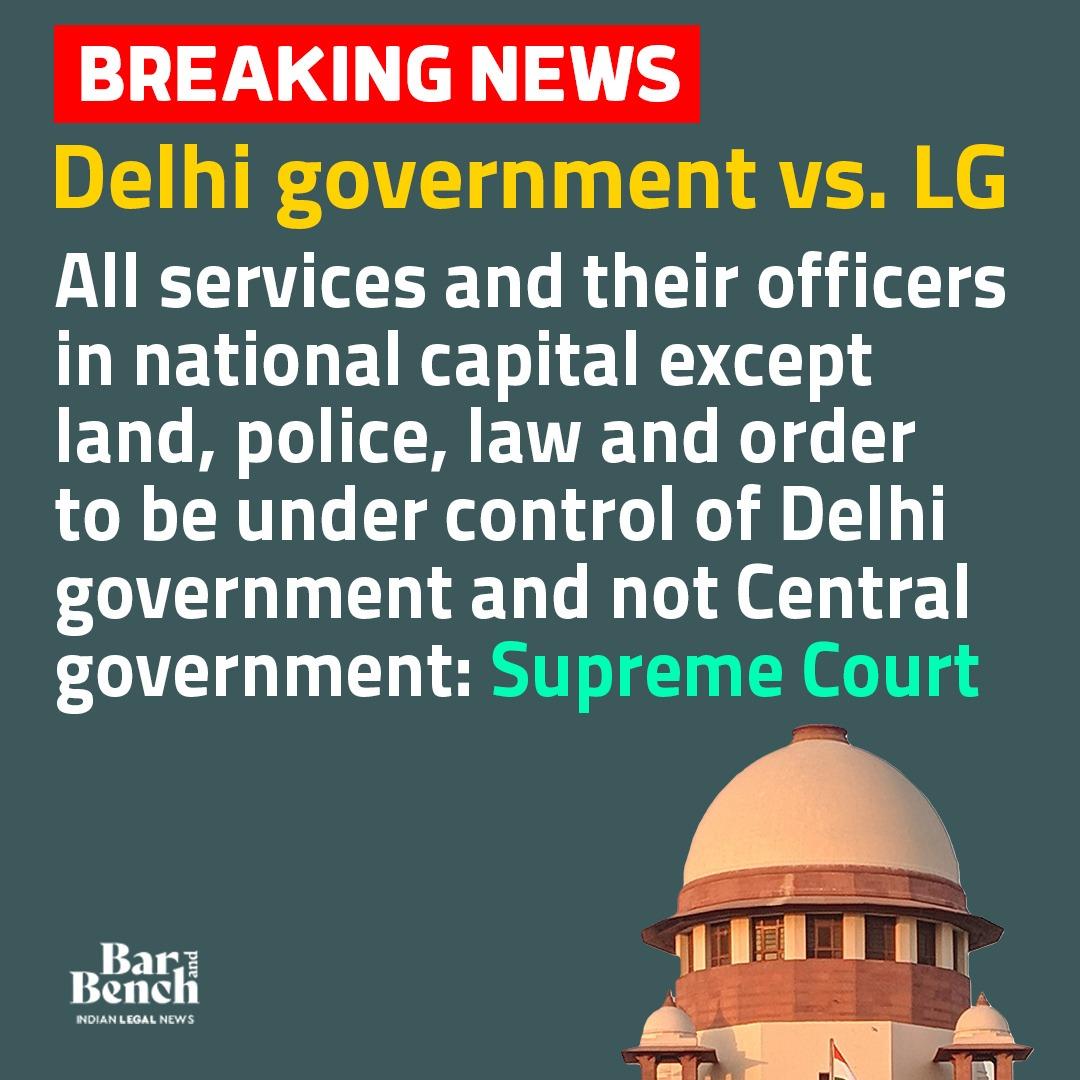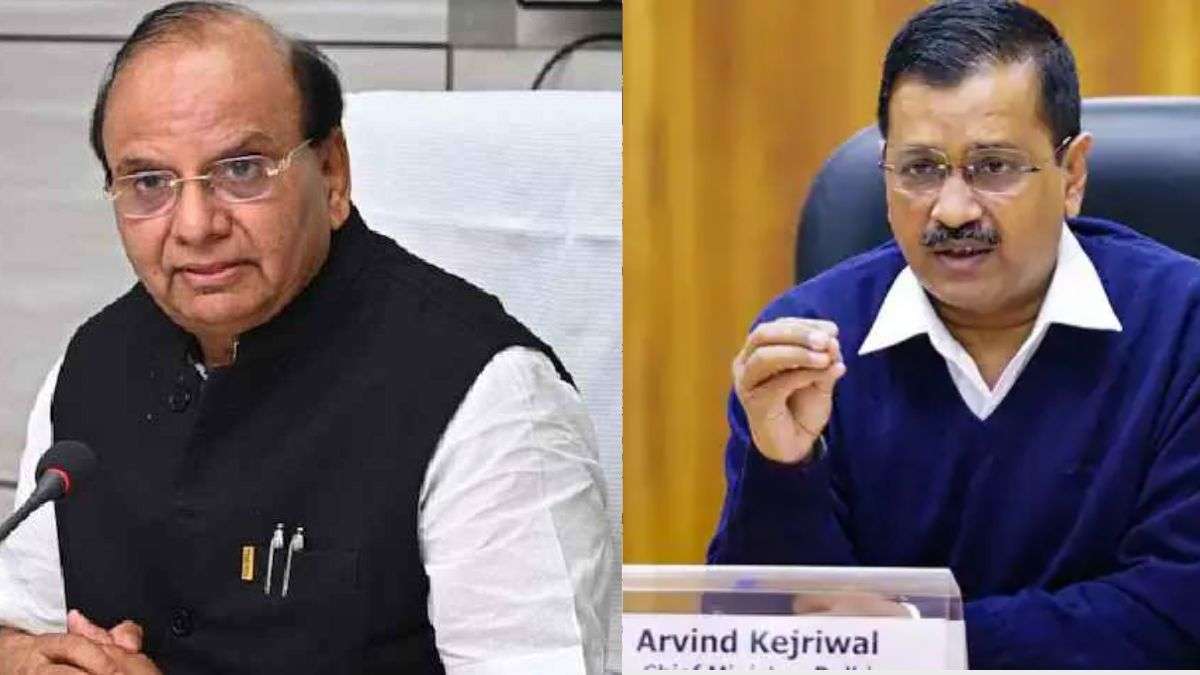Supreme Court Rules Delhi Government has Control Over IAS and All Services in Delhi except Land, Police, and Law and Order:
In a significant judgment, the Supreme Court has granted control over all services in the national capital, including the Indian Administrative Service (IAS), to the Delhi government, except for those related to land, police, and law and order. The Constitution Bench comprising Chief Justice of India DY Chandrachud and Justices MR Shah, Krishna Murari, Hima Kohli, and PS Narasimha passed a unanimous judgment on the matter.
Buy Prime Test Series for all Banking, SSC, Insurance & other exams

Explanation Behind the Decision:
The Court explained that the legislative power of NCT Delhi extends to IAS and that it will have control over them, even if they are not recruited by the NCT Delhi. However, the control does not extend to services related to land, law and order, and police. The Lieutenant Governor (LG) shall be bound by the decision of NCT Delhi over services apart from land, police, and law and order.
The Court justified its decision by stating that the LG shall exercise powers under the administrative role as entrusted by the President. The executive administration can only extend to matters that fall outside the scope of the legislative assembly. It cannot mean administration over the entire NCT Delhi. Otherwise, the purpose of having a separate elected body in Delhi will be rendered futile.
Importance of Democratically Elected Government:
The Court stated that a democratically elected government shall have control over its officers. If a democratically elected government is not allowed to control its officers and hold them to account, then its responsibility towards the legislature and public is diluted. If officers are not responding to the government, the collective responsibility is diluted. If officers feel they are insulated from the elected government, they feel they are not accountable.
Power of State or Union Territory:
The judgment stated that while a state or union territory has the power to make laws on subjects under the Concurrent List, the same will be subject to the existing Central law. At the same time, it has to be ensured that the governance of states is not taken over by the Central government. The Court went on to hold that sub-clause (b) of Article 239AA clarifies that Parliament has the power to legislate on any subject related to the NCT in any of the three lists. If there is a repugnancy between law enacted by legislative assembly and law enacted by the Central government, the former will be rendered void, it stated.
Background of the Case:
The case arose in 2018 when a Constitution Bench of the Supreme Court had interpreted Article 239AA of the Constitution, which contains special provisions with respect to the National Capital Territory (NCT). The peculiar status of the NCT and the powers of the Delhi Legislative Assembly and the LG and their interplay were debated in the case.
The Court in that judgment had ruled that the LG cannot act independently without the aid and advice of the Council of Ministers, and has to work harmoniously with the NCT government. The appeals relating to individual aspects including services were then placed before a regular bench for adjudication based on the Constitution Bench judgment.
The regular bench had on April 14, 2019, pronounced its verdict on various individual aspects relating to the tussle between the Delhi government and the LG. However, the two judges on the Bench – Justices AK Sikri and Ashok Bhushan – had differed on the issue of ‘services’ under Schedule VII, List II, Entry 41 of the Constitution of India.
About Delhi, key points:

- Delhi is the capital of India and is a union territory.
- It is governed by the Government of the National Capital Territory of Delhi (GNCTD) which consists of an elected legislative assembly and a council of ministers.
- The Chief Minister of Delhi is the head of the government and is appointed by the Lieutenant Governor (LG) who is the representative of the President of India. Current CM: Arvind Kejriwal
- The LG of Delhi has powers over land, police, and law and order while the remaining services are under the control of the Delhi government. Current Lieutenant Governor: Vinai Kumar Saxena.
- The LG is appointed by the President of India and holds executive power over the territory.
- Delhi is part of the National Capital Region (NCR) which includes areas around it in the states of Haryana, Uttar Pradesh, and Rajasthan.
- The NCR is a planning region and is governed by the National Capital Region Planning Board (NCRPB) which is chaired by the Union Minister of Urban Development.
- The NCRPB was set up to ensure that planning and development in the NCR are coordinated and integrated.
- Delhi has three municipal corporations which are responsible for providing civic services in the city.
- The power supply in Delhi is managed by the Delhi Electricity Regulatory Commission (DERC) which regulates the tariffs and other aspects of electricity supply in the city.
-
Delhi Police is a law enforcement agency that comes under the jurisdiction of the Government of India’s Ministry of Home Affairs. It is responsible for maintaining law and order in the National Capital Territory of Delhi. However, the Delhi government has limited control over the Delhi Police as it is a matter of the Centre’s jurisdiction. The Delhi Police is headed by a Commissioner of Police who reports to the Lieutenant Governor of Delhi.
Also Read: Supreme Court allows divorce on the grounds of “irretrievable breakdown of marriage”



 Indian Olympic Medal Winners List Till N...
Indian Olympic Medal Winners List Till N...
 Who is the Inventor of the Gramophone?
Who is the Inventor of the Gramophone?
 HS Dhaliwal Appointed New DGP Of Andaman...
HS Dhaliwal Appointed New DGP Of Andaman...
